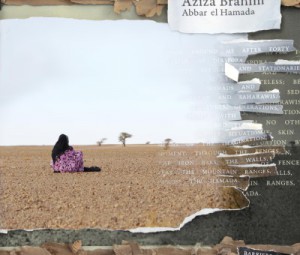 ‘Abbar el Hamada’ (Achter de Hamada) is de vierde CD van zangeres Aziza Brahim (1976) uit West-Sahara. Een evocatief album dat tegen de huidige immigratieproblematiek een bijzondere weerspiegeling is. Brahim werd geboren in een vluchtelingenkamp in Algerije en groeide op in Cuba en woont tegenwoordig in Barcelona.
‘Abbar el Hamada’ (Achter de Hamada) is de vierde CD van zangeres Aziza Brahim (1976) uit West-Sahara. Een evocatief album dat tegen de huidige immigratieproblematiek een bijzondere weerspiegeling is. Brahim werd geboren in een vluchtelingenkamp in Algerije en groeide op in Cuba en woont tegenwoordig in Barcelona.
English version below
Na de dood van de Spaanse dictator Franco in 1975 en de Marokkaanse inval in West-Sahara, vluchtte de moeder van Aziza Brahim naar een vluchtelingenkamp in Algerije waar Aziza werd geboren. Ze groeit uiteindelijk op in Cuba en woont tegenwoordig in Barcelona, Spanje. Met haar band Gulili Mankoo neemt ze in Spanje twee CD’s op, waarna twee releases volgen op het Glitterbeat Label. ‘Abbar el Hamada’ is haar vierde album. Een CD die de metafoor is voor het noodlot van West-Sahara. Een land dat al zo’n veertig jaar wordt onderdrukt. Aziza Brahim is niet alleen een geweldig muzikante, ze is ook activiste en woordvoerder van de Sahrawi bevolking. Met haar muziek gaat ze een dialoog aan in de hoop op een betere toekomst voor haar land, met teksten over sociale ongelijkheid, respect, waardigheid, en het (opnieuw) optrekken van landsgrenzen. Ze zingt er bevlogen over waarbij de muziek van de Sahrawi cultuur wordt gemixt met muziek uit Algerije, Marokko en West-Sahara. Fraai hoe de zang unisono wordt gevolgd door de gitaar en wordt aangevuld met meerstemmigheid zoals dat gebeurt in ‘Buscando la Paz‘, gevolgd door de Sahrawi-rock van ‘Calles de Daja‘. Bijzonder is ook de hese fluit in het mystieke ‘El canto de la Arena’ die de melodielijnen met elkaar verbindt. Opvallend zijn eveneens de Malinees aandoende solo’s van Kalilou Sangare terwijl Ignasi Cussó juist een Zuid West-Europese flair toevoegt, aangevuld met bas, percussie en keyboards. Aziza Brahim excelleert op ‘Abbar el Hamada’. Ze schittert oprecht en zingt met een laconieke zelfverzekerdheid waarbij de warme Atlantische Oceaanwind harmonisch tintelt tegen een zinderende muzikale hitte uit de Maghreb.
Meer Aziza Brahim – klik hier voor de recensie van ‘Soutak’
English version
‘Abbar el Hamada‘ (Across the Hamada) is the fourth album by singer Aziza Brahim (1976) from Western Sahara. An evocative album in a special reflection at current immigration issues. Brahim was born in a refugee camp in Algeria and grew up in Cuba and now lives in Barcelona.
After the death of the Spanish dictator Franco in 1975 and the Moroccan invasion of Western Sahara, the mother of Aziza Brahim fled to a refugee camp in Algeria where Aziza was born. She eventually grew up in Cuba and now lives in Barcelona, Spain. With her band Gulili Mankoo she recorded two CD’s in Spain, and later on two releases on the Glitterbeat label. ‘Abbar el Hamada’ is her fourth album. This CD shows the fate of Western Sahara. A country that has been suppressed for about forty years. Aziza Brahim is not only a wonderful musician, she is also an activist and spokesperson of the Sahrawi population. With her music she start a dialogue, hoping for a better future for her country, with lyrics about social inequality, respect, dignity, and (re)building borders. She sings passionate about it where the music of the Sahrawi culture is mixed with music from Algeria, Morocco and Western Sahara. Wonderful is the unison voice followed by the guitar, complemented by polyphonic harmonics, like in the song ‘Buscando la Paz‘, followed by the Sahrawi rock song ‘Calles de Daja’. Another special feature is the flute in the mystical piece ‘El Canto de la Arena‘ that connects the melody with the harmonics. Notable are also the Malian guitar solos by Kalilou Sangare and the European flair in Ignasi Cusso’s guitar playing, supplemented by bass, percussion and keyboards. On ‘Abbar el Hamada‘ Aziza Brahim excels as a musical ambassador. Her voice waves like a warm harmonic Atlantic Ocean breeze against the shimmering musical heat from the Maghreb. Splendid record!
More Aziza Brahim – click here for the review of her album ‘Soutak’.
- Aziza Brahim: ‘Abbar el Hamada’ (Glitterbeat / Xango).
© Mattie Poels.

Geen reacties